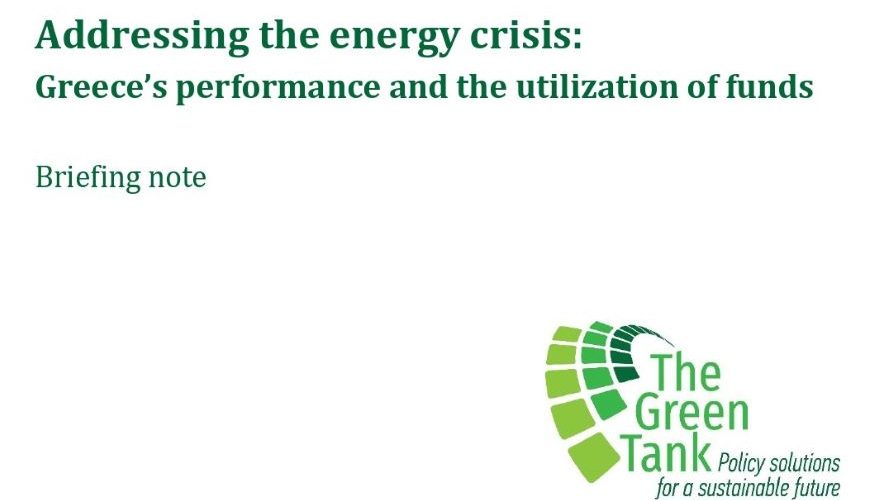The energy crisis that started in mid-2021 and culminated with Russia’s invasion of Ukraine led to a series of emergency measures at national and European level. The main objectives were to ensure energy security and to mitigate the impact of the energy crisis on businesses and households.
Especially for the crucial period of August 2022 – March 2023, the EU-27 set specific targets to reduce overall fossil gas consumption by 15%, and to reduce electricity consumption both overall by 10% and during peak hours by 5%, compared to a specific reference period.
The briefing note by The Green Tank titled “Addressing the energy crisis: Greece’s performance and the utilization of funds” assesses Greece’s performance in relation to these three European obligations, using data from DESFA, ADMIE and Eurostat. Also, drawing on relevant Ministerial Decisions and the State Budget Report, the note maps the allocation of national resources through the Energy Transition Fund and the state budget aimed at mitigating the impact of the crisis on businesses and households.
Based on the findings, Greece fully met two of its three European obligations. Specifically, the country achieved:
- a9% reduction in total fossil gas consumption during the August 2022 – March 2023 eight-month period, as compared to the five-year average.
- an 86.2% reduction in dependence on imported – via the Turkstream pipeline – Russian gas used to meet domestic demand over the August 2022 – March 2023 eight-month period. Taking into account Russian LNG imports as well, the decrease in total Russian gas imports used to meet part of domestic demand dropped to 65.4% over the seven-month period August 2022 – February 2023; this still constitutes a significantly better performance than the corresponding EU-27 average (-53%).
- an 8.4% reduction in electricity demand on the interconnected grid, as compared to the five-year average, in the November 2022-March 2023 five-month period. Despite failing to meet the target for the entire five-month period, Greece exceeded the -10% threshold in December 2022 (-10.9%) and January 2023 (-12.1%), while the reduction in total consumption was lower in the remaining three months.
- an 11.4% decrease in electricity consumption on the interconnected grid during all peak hours (18:00 to 21:00) over the four-month period of measure implementation (December 2022 to March 2023) compared to the five-year average.
On the allocation of national resources to mitigate the impact of the energy crisis on businesses and households, the findings show that:
- between September 2021 and December 2022 Greece raised €10.7 billion from different sources and channeled them into crisis relief measures.
- Of these €10.7 billion, €9,783 million directly subsidized electricity and gas bills, €821 million directly supported the income of various citizen groups, while the remaining €102 million represented tax reliefs.
In contrast, the EU funds totaling €1.424 billion provided by the European Regional Development Fund and the Recovery and Resilience Fund were utilized to achieve longer-term objectives; through the “Recycle and Change Appliance” and the “Economise 2021” programs, these resources financed efforts to reduce households’ overall energy consumption.
“The results of the analysis highlight the great potential that Greece has for reducing its carbon footprint and at the same time protecting households and businesses from the energy crisis, especially if the significant resources available to the Greek state are channelled, in the future, to projects and actions that will enhance the decoupling from fossil fuels on a permanent basis instead of continuing the policy of subsidizing energy consumption”, said Nikos Mantzaris, Policy Analyst and Partner, The Green Tank.
The Green Tank’s briefing note titled “Addressing the energy crisis: Greece’s performance and the utilization of funds” is available here.
More on the trends in fossil gas consumption and imports in Greece can be found in The Green Tank’s monthly analyses.



